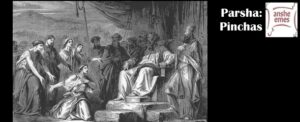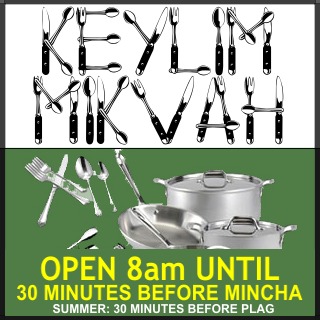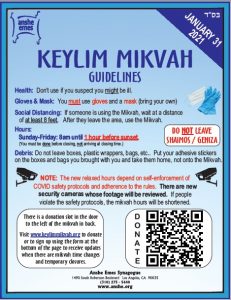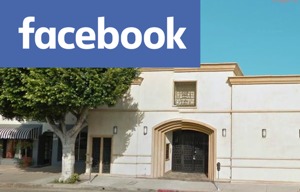PARSHA PINCHAS
I. SUMMARY
A. Pinchas is Rewarded. As a reward for his zeal in defending Hashem’s honor (i.e., after witnessing a flagrant act of immorality between an Israelite and a Midianite woman, Pinchas executed the evil-doers), Pinchas was made a Kohein and promised that the priesthood would be retained by his descendants.
B. A Census is Taken. The Israelites were ordered to prepare for an offensive war against the Midianites (who were primarily responsible for their degradation in the previous Parsha). Moshe and Elazar were told to take a new census of the men available for military service, as well as the numerical strength of each tribe (i.e., the land of Israel was to be allocated to each tribe in proportion to its size; it’s geographical location was to be determined by lots). The census totaled 607,730 men over the age of twenty (the Levi’im, who wouldn’t share in the division of the land, were counted separately).
C. Inheritance Rights. Zelophchad, who died in the wilderness, left five daughters but no sons. His daughters brought a claim to their father’s inheritance to Moshe, who in turn submitted it to Hashem. It was ruled that if one left no sons, his daughters had the inheritance rights (if there were neither sons nor daughters, it would go to his surviving brothers or, if none, to his nearest next of kin). Thus, the principle that land would remain in one’s family was firmly established.
D. Yehoshua is Chosen To Lead the Jews. Hashem commanded Moshe to ascend the Mountain of Abarim from where he could view Israel. Told that he was near the end of his life, Moshe (showing tremendous concern for the Jewish people) immediately asked that his successor be named. Hashem told him that Yehoshua ben Nun would assume leadership and that Moshe should lay his hands upon him to signify the transfer of authority. However, unlike Moshe, who had received guidance directly from Hashem, Yehoshua would be guided by Elazar the Kohein Godol, who would in turn consult Hashem by means of the Urim and Tumim.
E. The Sacrificial Offerings. The people were reminded that their sacrificial obligations would continue when they entered Israel; a detailed description of the daily (i.e., morning and evening) offerings, and mussaf offerings on Shabbos, Rosh Chodesh and Festivals, were given.
II. DIVREI TORAH
A. Growth Through Torah (Rabbi Zelig Pliskin)
1. Be willing to do the right thing even if it is unpopular. Pinchas’ actions were extremely unpopular; in fact, there were those who were ready to kill him for his zealousness. Nevertheless, he was willing to sacrifice everything to do Hashem’s will. We too must be willing to do the right thing, even in the face of opposition.
2. Family ties help a person have greater love for others. The Torah tells us that “it is not good for a person to be alone”. This, said Rabbi Zalman Sorotzkin, teaches us that we should choose family life over living by ourselves. Among other benefits, a family serves as a training ground for a person to build up his love for other person. A person has natural love for his family, through which he can learn to feel and express love to friends, acquaintances and others. In this week’s Parsha (as the land of Israel is being divided and the people were to be spread out throughout the land), the Jews were (for the first time) counted by families as a reminder that they should keep their family ties even as they each acquired their own property.
3. You can be successful even if you have less than others. The Chofetz Chaim noted that the population of the tribe of Binyamin was 45,600, while the tribe of Dan was 64,400. Yet, Binyamin had 10 sons, and Dan had only one son. Despite this disparity, Dan had more descendants than Binyamin. From here we learn, said the Chofetz Chaim, that if Hashem wants one to be successful, he will succeed even if it appears at first that he has less than others. Some people envy what others have, rather than enjoying their personal blessings and realizing that quantity is not always a valid measurement of success in life. One who takes pleasure with what he has is guaranteed a life of happiness.
B. Love Thy Neighbor (Rabbi Zelig Pliskin)
1. A righteous person keeps others’ welfare uppermost in his mind. After Moshe was told that he would soon die, he immediately asked Hashem to appoint a new leader. Even when he was near death, his concern was for the needs of the community. He is a tremendous role model for us.
2. A true leader deals with each person individually. Moshe asked Hashem to appoint a leader who would be able to deal with each individual according to his/her needs (Rashi). A true leader understands each person’s individual needs and deals with him/her accordingly.
C. In The Garden of the Torah (the Lubavitcher Rebbe, Rabbi Menachem M. Schneerson, z’tl)
Touching the Core. Pinchas’ act involved self-sacrifice and courage and is worthy of praise and reward, but why did it merit the reward of priesthood (which normally can’t be attained through man’s endeavors and isn’t dependent on spiritual accomplishments)? Pinchas exhibited true zealousness (i.e., putting his own spiritual and physical welfare aside and making an unbounded commitment to carry out Hashem’s will) tempered with love of his fellow man (i.e., his motivation to alleviate the plague). When a person makes a general commitment of this nature, the inner G-dly spark which every one of us possesses is given expression. These two thrusts — zealousness and love — are relevant to us today in reaching out to unaffiliated Jews, for zealous commitment tempered by warmth and loving outreach will spur others to discover the Jewish spark within themselves. This applies not only to our community leaders (since, after all, Pinchas was not the leader of the Jewish people), but to each us, for we each have a unique contribution to make.
D. Majesty of Man (Rabbi A. Henach Leibowitz)
A True “Zealot”. We learn from Pinchas two important characteristics of a true “zealot”: (a) he must be guided by true devotion to Hashem and Halachah (Jewish Law), not his emotions (despite the fact that Pinchas remembered the Halachah, he quickly ran to Moshe to ask permission to act); and (b) he must be motivated by compassion (rather than feeling anger towards the multitudes of Jews who stood by idly, Pinchas felt compassion and pity for his brethren; his intention was to atone for their lack of protest and to stop the plague that raged among them).
E. Wellsprings of Torah (Rabbi Alexander Zusia Friedman)
True Zealousness. “In that he was zealous for My sake in the midst of them”. By killing Zimri out of his own zeal for the sake of Hashem, Phincas brought into the midst of the Jewish people the ideals of righteous zeal which would make them utterly unable to tolerate idol worship (Rabbi Menachem Mendel Morgenstern; Sfas Emes). Even though Phincas was zealous in the cause of Hashem, he remained in “the midst of the Jews”, refusing to set himself apart from them.
F. Peninim on the Torah (Rabbi A.L. Scheinbaum)/Drash Moshe (Rav Moshe Feinstein, zt’l)
Completing Hashem’s work. “In that he avenged My [Hashem’s] revenge among them”. Rashi explains that this means that “Phincas displayed the anger which I [Hashem] should have displayed”. The reason Phincas deserved such a great reward was that he performed an act which was considered reserved for Hashem; he could have easily excused himself by stating that it was Hashem’s realm. This attitude of not looking for excuses should permeate our entire Torah observance. The Talmud states that the wicked Turnusrufus once asked Rabbi Akiva why Hashem doesn’t support the poor, to which Rabbi Akiva responded that Hashem wants the merit of this mitzvah to benefit those who take the initiative to perform it. This can be compared to a parent who allows his child to “help” him, so as to give the child the feeling of being helpful and the opportunity to “give back” to his parent. This is also exemplified by the mitzvah of Bris Milah — Hashem could have made Jewish males to be born circumcised; however, He desired that we complete His deeds, for which the reward is great. (It is particularly compelling with the mitzvah of Bris since normally the ownership seal of a servant is made by his master; when a Jew is circumcised, he imposes upon himself the seal of the covenant with his master, Hashem.)
G. Living Each Day (Rabbi Abraham Twerski)
Life Is Spirituality. The Torah teaches that spirituality is not merely an important concept of life, but is life. In this week’s Parsha, Hashem tells Moshe to do battle with the Midianites because of their attempts to corrupt the Israelites; yet, this command isn’t even given in connection with the Egyptians, who unleased tremendous physical cruelty unto Jews. We learn from this that spiritual danger is far worse than physical danger (as painful as the latter may be, the Jewish people have survived — and will survive — physical dangers). We must take the same (and even greater) precautions that we take to protect our physical safety to safeguard our spirituality.
H. Living Each Week (Rabbi Abraham Twerski)
1. True Zealousness. Rabbi Moshe of Coucy asks: “in as much as Pinchas’ act of zeal is narrated in the last Parsha, why does the account of his reward not follow immediately but is delayed until this (the following) Parsha?” Rabbi Moshe answers that not all acts of zeal are virtuous. What appear to be acts of zeal may actually be acts of immature impulsiveness or simple intolerance of others’ opinions and values. Hence, an act of zeal cannot be correctly evaluated until the zealot’s behavior is clearly observed — if his subsequent behavior proves him to be a mature individual, deliberate in his actions and considerate of others’ rights and opinions, then his act may be considered to have been sincere and commendable. If, however, his subsequent behavior doesn’t exhibit mature and responsible behavior, then it is likely that his act was merely an act of impulsiveness and intolerance. Therefore, says Rabbi Moshe, Pinchas’ reward was delayed for a “waiting period” during which his behavior could be evaluated.
2. Sensitivity to others’ needs. Rashi explains that the description of Yehoshua as a “man with spirit” means that he was able to proceed according to the spirit of each individual. A common explanation for Hashem’s denial of Moshe’s request to enter Israel was that it was a punishment for his lack of self-control in hitting the rock. There is, however, another possible explanation — the denial of Moshe’s request was not a punishment, but was a statement that he could no longer function as a leader. During the forty years, Moshe grew in kedushah (holiness), such that at the end of his life the Torah refers to him as a “man of G-d,” and the Midrash comments that he was half-man and half-angel. On three occasions, he spent 40 consecutive days and nights without food or water. His ties with the physical needs of the human body became increasingly tenuous. The culmination of this was his reaction to the Jews when they demanded water, a demand to which he responded angrily. Although they previously manifested a lack of faith in Hashem, Moshe’s previous reaction had always been to defend them before G-d. He knew that hunger and thirst could be so destructive that they could erode a person’s faith and cause them to challenge G-d. This time, however, Moshe did not defend them, but became angry. How dare they allow their thirst for water — a basic need — to cause them to challenge G-d! At this point, G-d told Moshe that it was time for a change of leadership. Moshe could be the leader as long as he could be an advocate for the Jewish people’s needs, even their earthly needs. Now that he had reached a level of kedushah at which he was completely removed from his physical needs, his function as a leader had come to an end. What is true about the relationship of the leader to the community is also valid, on a lesser scale, in the relationship of one person to another. We may be in a particular state or position in which we are not empathetic to another’s needs. The Tzaddik of Sanz was known for his limitless charity. One time his wife complained that she saw a woman to whom he had given charity purchasing a duck, a delicacy which is hardly an essential of life. “I am so pleased that you have apprised me of this,” he responded to her. “Now that I know that I must give her enough money to buy duck, for this is one of her needs.” Even if we do achieve this amazing level of empathy, we should be aware that it is possible for us to be oblivious to the legitimate needs of others just because we do not identify with them. We must always be on the alert to be sensitive to others’ needs.
3. Simcha reigns supreme. This Parsha is almost always read during the Three Weeks between the 17th of Tammuz and the 9th of Av, a period of mourning to commemorate the destruction of both Temples in Jerusalem and the expulsion from our homeland. This Parsha contains the service for all Festivals. Therefore, said Rabbi Tzvi Elimelech, it is read during the period of mourning so that we do not get swept away by the various mourning rituals practiced during this three-week period. We are reminded that the period of grief will pass, and we will once again rejoice. Few people are so fortunate as to have a live without episodes of sadness. Some people react to unpleasant occurrences with depression so severe that it renders them unable to function. This may give rise to a self-reinforcing cycle, and the activity resulting from the depression may become a curse of further depression. The counter to this is to always remember that there is joy in the future. It is told that King Solomon was consulted by a person who had severe mood swings, episodes of unrealistic elation alternating with periods of paralyzing depression. King Solomon had the royal goldsmith fashion a ring with the inscription, “this too shall pass.” At time of euphoria, this would remind him of the transitory nature of this phase and at times of severe dejection it would remind him that relief was ahead. Our own personal history should be a source of strength to us — each of us has had a time when we felt extremely discouraged and couldn’t see the light at the end of the tunnel. Yet, we emerged from these episodes and again experienced joy in life. We must remember these episodes and, if difficult days come again, ask ourselves: “why should this be any different?” Granted that we may be in serious distress at this particular moment, but we should remember that we have faced serious challenges in the past and that “this too shall pass.” In the Festival services, we refer to them as “Festivals for joy,” rather than “Festivals of joy”. This means that the occasions of the joyous celebrations of the Festivals should provide us with a sense of joy that should extend into the rest of the year, even into periods when sadness may prevail. Similarly, we should carry other moments of joy in our lives with us, particularly for those times when we are required to face difficulties.





 Visit the group and request to join.
Visit the group and request to join.
